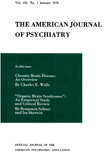Fluphenazine decanoate and tardive dyskinesia: a possible association
Abstract
The authors examined the charts of 22 outpatients who had received intramuscular fluphenazine decanoate and oral fluphenazine hydrochloride to assess the incidence of tardive dyskinesia. The severity of tardive dyskinesia was assessed with the Abnormal Involuntary Movement Scale (AIMS). Both the total dose and average daily dose of fluphenazine decanoate correlated significantly with high AIMS scores. There were also significant correlations of AIMS scores with total dose of antiparkinsonian medication and total dose of other neuroleptics. Total dose of antiparkinsonian medication correlated with total dose of fluphenazine decanoate. The authors discuss the clinical and physiological implications of these correlations.
Access content
To read the fulltext, please use one of the options below to sign in or purchase access.- Personal login
- Institutional Login
- Sign in via OpenAthens
- Register for access
-
Please login/register if you wish to pair your device and check access availability.
Not a subscriber?
PsychiatryOnline subscription options offer access to the DSM-5 library, books, journals, CME, and patient resources. This all-in-one virtual library provides psychiatrists and mental health professionals with key resources for diagnosis, treatment, research, and professional development.
Need more help? PsychiatryOnline Customer Service may be reached by emailing [email protected] or by calling 800-368-5777 (in the U.S.) or 703-907-7322 (outside the U.S.).



